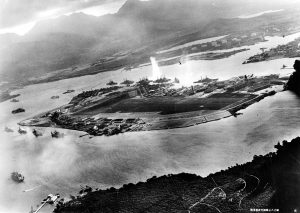This post will likely run a day after the 79th anniversary of the attack on Pearl Harbor; President Franklin Delano Roosevelt rightly claimed it “a date which will live in infamy.” Yet when was the last time you heard this word used in any context?
I hope we remember to pause on that day of infamy, reading FDR’s speech annually, but I also hope we add this word to our working vocabularies. FDR’s first draft read “a date which will live in world history,” but as a source at the National Archives explains, he inserted “infamy” when revising the typescript of what he’d dictated. How he produced something that profound, under so much pressure, should inspire us to do better amid the crisis we face in these comparatively easier times.
The meaning is plain: we understand “fame” being positive, so “infamy” and “infamous” are negative. The term’s origin is Latin and French, as the OED puts it. I suspect an origin far older than the 15th Century, though like many words discussed here, it’s less a matter of first use than of Gutenberg’s invention providing us with the means to check surviving texts.
One legal definition is new to me, of a “loss of all or certain of the rights of a citizen, consequent on conviction of certain crimes.” That seems reasonable enough for some infamous folk, once convicted by a jury of their (presumaby, not infamous) peers.
Send words and metaphors to jessid -at- richmond -dot- edu. See all of our Metaphors of the Month here and Words of the Week here.
image from Wikipedia: first moments of the first wave of Japanese carrier planes over Ford Island, Pearl Harbor

Since a couple of folks asked about it, on Pearl Harbor Day. I sent this to a colleague about a conspiracy theory involving FDR. My research shows no basis in fact. Read on.
In another life, I’d have not gotten a PhD in English. I’d have been an historian of the Second World War. As for FDR and theories of complicity, we know this from scholarly sources: he and the US Military knew an attack was coming but not where. They had no idea that Pearl Harbor could be hit that way by Japan’s carrier force. I spoke at length to my colleague David Evans, who shortly before he passed away, published the definitive history of the prewar Japanese navy, Kaigun. Historians note that Guam, US interests in China, and of course the Philippines were considered likely targets because of Japan’s desire for oil from the Dutch East Indies. As a precaution, US aircraft were grouped in Hawaii against saboteurs, considered the biggest danger, but that made them vulnerable to air attack.
The primary sources, including declassified ones from the Pentagon, say that Roosevelt knew nothing about an air attack on Pearl. The big worry was Japanese nationals committing acts of sabotage.
Had he known, or had our admirals not underestimated the genius of a man like Isoroku Yamamoto, FDR could have easily set a trap or at least minimized damage and still gotten a war with Japan started by them, not us.
I’ve an obsession with the Pacific War, and my own study of dozens of books on the topic reveals this consensus view to be well supported. Of note, psychologically, is how inferior we presumed Japanese fighter aircraft to be, and how little we regarded the quality of Japanese pilots. They were a fragile weapon (Dave Evans called it a razor-sharp blade, deadly but easily broken) but no pilots in the world had that level of skill. Even RAF aces from the Battle of Britain learned to respect the Japanese aviators over Burma. Saburo Sakai, who survived the war, could take on dozens of Allied planes and win.
I’m generally immune to conspiracy theories. FDR had put us on a war footing in the late 30s, and most experts figured that a war with Hitler and the Tojo regime was coming, but there’s no credible evidence that the US withheld information about Pearl Harbor being a primary target.